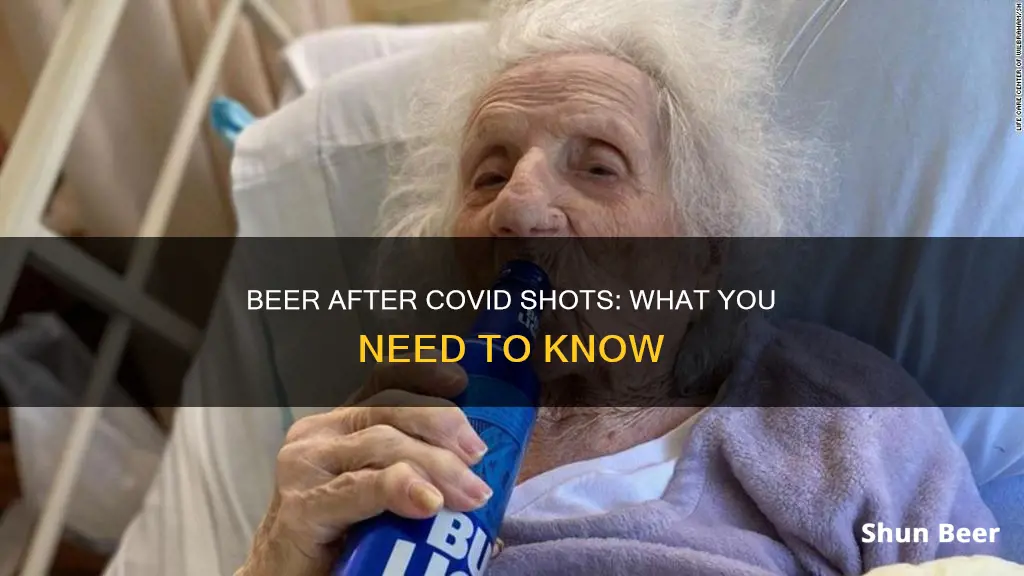
There is no official guidance on drinking alcohol after receiving a COVID-19 vaccine or booster shot. However, some experts advise against drinking alcohol, especially heavily, immediately post-vaccination. This is because hangover symptoms like fatigue, headache, and nausea may worsen the side effects of the vaccine. Research has shown that chronic heavy drinking negatively impacts your immune system and can lead to several health issues. However, light to moderate drinking may not significantly affect your immune response.
Can I drink beer after my second Covid shot?
| Characteristics | Values |
|---|---|
| Is there any official guidance on drinking alcohol after the second Covid shot? | No. There is no official guidance on drinking alcohol after the Covid shot. |
| Is it safe to drink alcohol after the second Covid shot? | There is no conclusive evidence that alcohol reduces the vaccine's effectiveness. However, drinking alcohol may worsen the side effects of the vaccine, such as fatigue, headache, and nausea. |
| What do experts say about drinking alcohol after the second Covid shot? | Some experts advise against drinking alcohol, especially heavy drinking, immediately after the Covid shot. Others say there is no reason you cannot drink alcohol after the vaccine, as long as it is light or moderate drinking. |
| How does alcohol affect the immune system? | Alcohol consumption affects the immune response and can impair the body's ability to defend itself against infection. Chronic heavy drinking increases the risk of bacterial and viral infections. |
| What are the side effects of the Covid vaccine? | Common side effects include pain, redness, or swelling on the arm where the shot was given, tiredness, headache, and muscle pain. |
What You'll Learn

Alcohol may worsen side effects of the vaccine
While there is no conclusive evidence that alcohol reduces the COVID-19 vaccine's effectiveness, drinking alcohol can still worsen its side effects.
Alcohol has been shown to affect the immune response. Studies show that alcohol can disrupt immune pathways and impair the body's ability to defend itself against infection. Excessive alcohol consumption increases susceptibility to immune-related conditions such as acute respiratory stress syndrome (wet lung).
Additionally, hangover symptoms like fatigue, headache, and nausea may mimic or worsen the side effects of the vaccine, which include fever, headache, fatigue, and pain at the injection site.
Some experts advise against drinking alcohol, especially heavy drinking, immediately after receiving the vaccine. According to Jagadeesh Reddy, MD, an infectious disease specialist,
> "Though there is no data on this, it is advisable to abstain or reduce alcohol intake for the first 48–72 hours after vaccination. This is the usual period one might expect common and usually mild after-effects of vaccination, like fatigue, muscle aches, injection site pain."
Therefore, while there is no official guidance on drinking alcohol after the COVID-19 vaccine, it is recommended to refrain from drinking or reduce alcohol intake for a few days to allow your body to recover from the vaccine and avoid potential adverse effects.
Mormons and Beer: What's the Religious Stance on Alcoholic Drinks?
You may want to see also

There is no evidence that alcohol affects the vaccine's efficacy
While there is no official guidance on drinking alcohol after receiving a COVID-19 vaccine, there is also no evidence that alcohol affects the vaccine's efficacy.
According to a Canadian media outlet, CTV News, there is "no evidence of interference from alcohol intake on vaccination efficacy or safety that would require such a warning." This statement is backed up by Health Canada, which stated that "there is no evidence of interference from alcohol intake on vaccination efficacy or safety."
Some experts advise against drinking alcohol after getting vaccinated, especially heavy drinking. This is because alcohol can cause side effects such as fatigue, headache, and nausea, which may mimic or worsen the side effects of the vaccine. However, there is no evidence that alcohol affects the vaccine's efficacy.
It is important to note that chronic heavy drinking has been shown to increase the risk of bacterial and viral infections and can negatively impact your immune system. Therefore, it is always advisable to drink in moderation.
Beer Consumption and Type 1 Diabetics: What's Safe?
You may want to see also

Experts advise against drinking heavily after getting the vaccine
While there is no official guidance on drinking alcohol after receiving a COVID-19 vaccine, some experts advise against drinking heavily after getting vaccinated.
Although there is no evidence that alcohol affects the efficacy of the vaccine, some experts suggest that it is best to abstain from or reduce alcohol intake for the first 48 to 72 hours after receiving the vaccine. This is because the side effects of the vaccine, such as fatigue, muscle aches, and injection site pain, are usually mild and common within this period. Drinking alcohol during this time may worsen these symptoms or make it difficult to distinguish them from hangover symptoms.
Additionally, chronic heavy drinking has been shown to increase the risk of bacterial and viral infections. It can also damage your immune function, making it harder for your body to fight off infections and increasing the risk of complications. Therefore, it is advisable to avoid excessive alcohol consumption, especially if you are immunocompromised.
However, light-to-moderate drinking may not significantly impact your immune system. According to the 2020-2025 Dietary Guidelines for Americans, moderate drinking is defined as one drink per day for females and two drinks per day for males.
Beer and Nicotine: A Risky Mix?
You may want to see also

Drinking alcohol may damage your immune function
There is no official guidance on drinking alcohol after the COVID-19 booster and vaccine. However, some experts advise against drinking alcohol, especially heavy drinking, immediately after receiving the booster and vaccine. This is because drinking alcohol may damage your immune function.
Research has found that drinking alcohol every day may increase the risk of severe side effects from the flu vaccine. While there is no evidence that alcohol affects the efficacy of the COVID-19 booster and vaccine, a 2016 review noted that chronic heavy drinking has been shown to increase your risk for bacterial and viral infections. The CDC defines heavy drinking as more than seven drinks per week for females and more than 14 for males.
Chronic, heavy alcohol use will impact your immune system response and lower your immunity. Even a single episode of binge drinking in otherwise healthy individuals can hinder your immune system. For example, a 2021 study in Antioxidants found that binge drinking increases gut permeability, allowing toxins, bacteria, and other gastrointestinal "things" to leak through. This can fuel a state of low-grade chronic inflammation.
Therefore, while there is no reason why you cannot drink alcohol after your COVID-19 vaccine or booster, it is important to drink in moderation. Heavy chronic alcohol use negatively impacts your immune system, but light occasional use does not.
Beer and Ciprofloxacin: Is It Safe to Mix?
You may want to see also

Alcohol may increase the risk of severe side effects from the flu vaccine
While there is no official advice to avoid drinking alcohol after receiving a COVID-19 vaccine, excessive alcohol consumption can increase susceptibility to immune-related conditions and negatively impact your immune system. According to Brierley Horton, a dietitian nutritionist, even a single episode of binge drinking in otherwise healthy individuals can hinder your immune system. Therefore, it is recommended to avoid excessive alcohol consumption that may cause a hangover after receiving the flu vaccine, as it may increase the risk of severe side effects.
Chronic, heavy alcohol use will impact your immune system response and lower your immunity. Research has shown that binge drinking increases gut permeability, allowing toxins, bacteria, and other foreign substances to leak through the gastrointestinal tract. This can lead to a state of chronic low-grade inflammation, as evidenced by an increase in the circulation of pro-inflammatory compounds.
Additionally, alcohol can affect the body in complex ways. While moderate alcohol consumption may enhance the response to classical vaccines, chronic alcohol exposure can have detrimental effects. For example, a 2023 review suggested that alcohol may activate ACE2 receptors, which are the same receptors targeted by the COVID-19 virus. This could potentially enhance the harmful effects of the SARS-CoV-2 spike protein.
Furthermore, chronic alcohol consumption may exacerbate heart problems after receiving an mRNA COVID-19 vaccine, especially in individuals who are unaware of early-stage cardiovascular diseases such as myocarditis. It is important to note that there is no direct evidence that moderate alcohol consumption affects the health of vaccinated patients. However, heavy alcohol consumption is associated with a low immune response, and vaccination in this state may pose additional risks.
In conclusion, while there is no official recommendation to avoid alcohol after a COVID-19 vaccine, excessive alcohol consumption may increase the risk of severe side effects from the flu vaccine. It is crucial to drink in moderation and be mindful of your body's response to both alcohol and the vaccine.
Beer Left Out Overnight: Is It Safe to Drink?
You may want to see also
Frequently asked questions
There is no official guidance on drinking alcohol after getting a COVID-19 vaccine or booster shot. However, some experts advise against drinking heavily after getting vaccinated. This is because hangover symptoms like fatigue, headache, and nausea may mimic or worsen the side effects of the vaccine. Moderate drinking is unlikely to impair the immune response to the COVID vaccine, but heavy drinking might.
There is no conclusive evidence of an interaction between alcohol and the COVID vaccine. However, alcohol does affect the immune response and can impair the body's ability to defend itself against infection.
It is generally recommended to wait for a few days after getting the COVID shot before drinking beer or any other alcoholic beverage. This is because the side effects of the vaccine usually show up within the first 48-72 hours.
There is no official guidance on drinking alcohol before getting a COVID-19 vaccine or booster shot. However, it is generally recommended to avoid alcohol before getting the shot as drinking may cause fatigue, headache, and nausea, which may worsen the possible side effects of the vaccine.
You can always celebrate with your favourite beer a few days after the vaccination. Just stick to the recommended limit of one or less per day for females and two or less for males.







